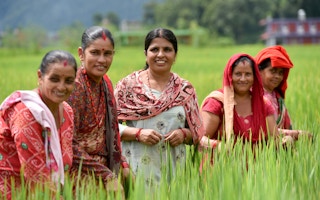Like farmers planning the following season’s crop, we must now sow the seeds of the post-pandemic future we want. That means putting gender equality and sustainability at the heart of the recovery and promoting more inclusive development through “good trade.”
The most serious challenge we face is economic inequality – not only between and within countries. In particular, Covid-19 has revealed the depth of gender inequities, with women suffering the most from the pandemic’s economic fallout.
Research by the International Trade Centre shows that nearly 65 per cent of women-led small businesses across 120 countries have been strongly affected by the crisis (compared to just over half of firms led by men). Sectors that employ mostly women – including retail, hospitality, tourism, and artisanal and light manufacturing – were hit the hardest.
Moreover, accelerated digitalisation and shifting supply-chain configurations mean that female entrepreneurs everywhere – but especially in developing countries – face additional obstacles, ranging from accessing information and resources to building skills and networks.
In a recent commentary in the Financial Times, Linda Scott of the University of Oxford’s Saïd Business School called for an end to the “male monopoly” in international trade. If women became significant agents in the economic recovery, she argued, then, “a cascade of benefits would result and suffering would be substantially reduced.”
Successfully tackling this challenge would reposition women entrepreneurs in new global value chains, helping them to meet modern product standards and take advantage of proliferating e-commerce opportunities.
The post-pandemic recovery also needs to be sustainable – and business is responding. Last month, more than 20 leading firms from Adidas to Unilever welcomed the European Union’s initiative to introduce new binding standards to promote sustainability, while more than 1,000 CEOs signed a United Nations statement calling for renewed global cooperation.
Policymakers, too, are increasingly linking the post-Covid recovery to climate action – as the French government’s conditional bailouts of Air France and Renault illustrate. At the recent UN General Assembly, China announced its intention to become carbon-neutral before 2060, and called on all countries to “achieve a green recovery of the world economy in the post-Covid era.”
European, Latin American, Caribbean, and Pacific leaders are putting climate mitigation and inclusive development at the center of their pandemic recovery plans. Some, such as New Zealand’s prime minister, Jacinda Ardern, have pledged to link their Covid-19 responses to climate action. Versions of green new deals are gaining traction around the world.
In September, European Commission President Ursula von der Leyen laid out plans to cut the EU’s greenhouse-gas emissions by 55 per cent by 2030. France had earlier adopted a €100 billion ($117.6 billion) recovery plan, including €30 billion to support a green transition.
The mood is changing. The world is looking for ways to pivot to good trade – cleaner, fairer, and more resilient to shocks. But new schemes must not overlook support for the micro, small, and medium-size enterprises – many of them run by or employing women – that participate in global value chains and drive local economies.
For example, the EU’s proposed carbon border adjustment mechanism – which von der Leyen highlighted in her State of the Union address – will raise concerns in developing countries.
The Boston Consulting Group thinks such a regime would mean that, “non-European companies that had been under little regulatory pressure to map, report, and control their emissions would have to build these capabilities quickly and scramble to catch up in order to remain competitive in Europe.”
As a result, a European paper company, for example, that can cope with a border-adjustment mechanism may gain a competitive advantage over an Asian or African firm in the same sector that currently exports to Europe. The international community needs to develop a broad understanding of how to build a cleaner, more equal world, and work with public and private-sector partners toward common goals.
Regarding value chains, small and medium-size enterprises are themselves pushing industries to address the challenges of social and environmental compliance and reduce “audit fatigue.” Initiatives such as the Social and Labor Convergence Program, which serves the apparel and footwear sectors, can be supported by modest funding and hosted by a neutral, not-for-profit organisation.
They can provide efficient, scalable, and sustainable social assessments across industries and along value chains, and deliver credible and comparable data. This model frees up resources for firms to improve working conditions and processes − and could lend itself widely to post-Covid compliance regimes in developing countries.
On gender equality, a growing number of corporations such as UPS, MasterCard, Visa, Procter & Gamble, and eBay support women’s entrepreneurship through supply-chain diversity programs, mentoring, capacity-building schemes, and targeted services.
These initiatives have scaled up by leveraging the expertise and networks of international organisations and local institutions, tapping resources that governments often lack, and they can be deployed in flexible and market-based ways.
The many inequities exposed by Covid-19 are becoming increasingly hard to ignore. We have a golden opportunity to build back boldly and put gender equality, social responsibility, and environmental protection at the core of our plans. With a deliberate and strategic focus on these issues, the future we sow could be more bountiful than the past.
Pamela Coke-Hamilton is Executive Director of the Geneva-based International Trade Centre (ITC), a joint agency of the United Nations and the World Trade Organisation.
Copyright: Project Syndicate, 2020.
www.project-syndicate.org















